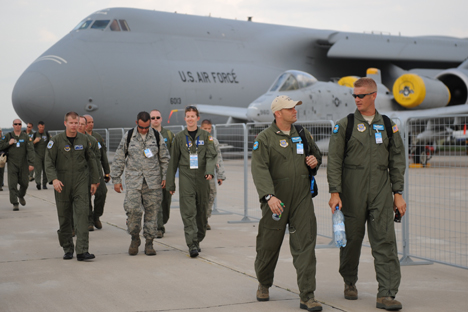
American military officers will go through Russia more frequently. Previously, they paid annual visits to Russia only for the MAKS International Air-shows (pictured). Source: ITAR-TASS
Russia has given the go-ahead for NATO cargoes to be transported from Afghanistan via Ulyanovsk, a town 560 miles to the east of Moscow. According to official sources, preparations will be completed soon. The transit point could start operating as early as this month; NATO envoy to Russia Nikolai Korchunov previously mentioned Aug. 1 as a potential start date.
Russia announced its intention to play a bigger role in withdrawing cargoes from Afghanistan in March and proposed the creation of an air-and-land transfer center in Ulyanovsk. The decision was greeted with hostility in Russia, however, with some opposition members – Communist Party supporters in particular – accusing the administration of President Vladimir Putin of planning establish a full-fledged NATO base in Russia.
Patrick Auroy: “NATO sees Russia as a partner, not as a threat”
For NATO, the Ulyanovsk transit center comes with a number of advantages. It has a decent-sized runway capable of handling large air carriers, a newly renovated branch rail line to the airfield, and a low volume of air traffic. No major construction projects are currently underway at the site, and airport officials maintain that there are no such plans in the pipeline – indicating that there is no way a NATO base could be under construction in the city. The Ulyanovsk hub will not leave the territory of the airport itself.
“This is the normal operation of the airport. If they tell us to accommodate planes, then we accommodate planes. If they tell us not to, we don’t,” said Oleg Shalkin, the airport’s deputy commercial director.
Weekly pickets by local Communist Party activists in both the Ulyanovsk city center and the surrounding region are the only things disturbing the seemingly peaceful picture. “Money should be made by modernizing the aviation industry, and not by the American military,” said Alexander Kruglikov, first secretary of the Ulyanovsk region Communist Party committee.
Kruglikov also expressed doubts about the ability of the local customs officials to adequately control the cargo flow. The Federal Customs Service has been restructuring the Volga region administration for some time, and there are plans to reduce the staff at the Ulyanovsk customs house by more than two thirds.
Valery Gerasev, head of the Ulyanovsk customs office confirmed the plans. “More than 200 personnel will be transferred. The customs office in the airport will be transformed into a customs clearance and customs control station with a staff of 24,” Gerasev said, although he added that the reorganization is unlikely to be completed by Aug. 1.
Commenting on the guidelines for checking the containers coming from Afghanistan, Gerasev said that the official document governing the work of the hub contained no specific instructions. “There is a provision in it that says ‘Cargo handling of transferred arms, equipment and materials shall be carried out in the presence of officials.’ What this means I cannot say. A customs official will soon be coming to see us. We’ll have a meeting and will address this matter as well,” he said.
Gerasev believes it is unlikely that local customs officers will need to open the containers; they will simply check and affix seals.
Nikolai Doronin, deputy head of the Ulyanovsk region government, said that the customs issue would not become a stumbling block because the airport customs service works perfectly. Doronin said that in terms of the NATO transit deal, the region will only benefit from “additional taxes, jobs and profits of Volga-Dnepr air carrier.” “It is very good from the point of view of making money,” Doronin said.
This article has been abridged. The original Russian version is available in Vzglyad internet newspaper.
All rights reserved by Rossiyskaya Gazeta.
Subscribe
to our newsletter!
Get the week's best stories straight to your inbox